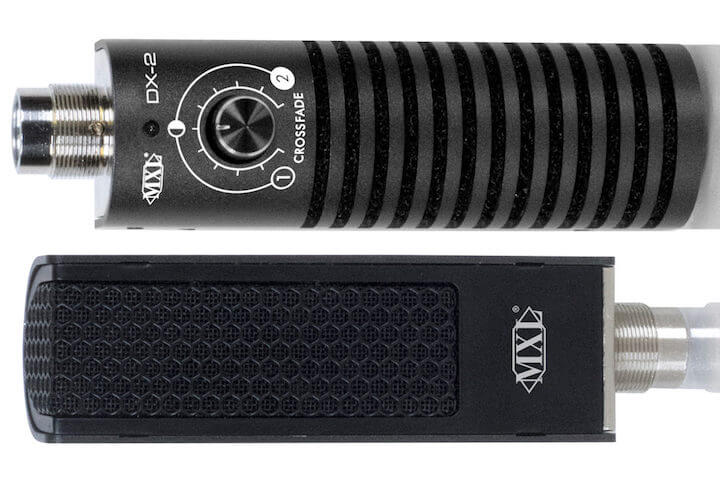Performer Magazine Reviews the MXL DX-2 Dual Capsule Variable Dynamic Instrument Microphone
It’s not uncommon to use multiple microphones on a single guitar amp, and blending the two signals. This approach has a few small downsides: optimum placement of both mics, making sure the microphones and speaker(s) are in phase with each other, as well as using two separate tracks (and plug-ins) in a DAW that can eat into processing power. MXL has introduced a dual capsule microphone, the DX-2, that is literally two mics in one to solve all those issues.
Inside the metal casing are two mic capsules, a cardioid and a super cardioid. A small blend control on the back side allows the user to select the capsule.
The cardioid side captures a lot of richness and warmth, with a full-bodied response. It still has plenty of cut and top end, but retains a lot of thump, with distorted chords having plenty of punctuation. At the other end of the spectrum the super cardioid has a much tighter and snappier feel, with a lot of mid-range response that carries over into some of the higher frequencies.
Blending the two signals in the center is as expected, a nice mix of both capsules. Depending on a few variables, such as guitar, amp, effects, tone, etc., setting it at the middle is a great place to start, and then you’ll simply the control knob to start tweaking to get the blend of the two just right. An excellent application is favoring the super cardioid for rhythms, and then switching over to cardioid for leads and overdubs — no swapping mics or placement.
There’s a decent range of adjustment between both capsules, so finding that sweet spot for any track is super easy. With no EQ or outboard gear, the signal is very robust. Not having to add extra adjustments saves time not only during tracking, but during mixdown as well. There is an included mic stand mount, but it’s super easy to use by snaking the mic cable through the handle of an amp (when using a combo).
Street price comes in at $149, and while there are more conventional mics out there to record guitar, this was designed to provide flexibility that would normally only come from swapping out mics to solve tonal or frequency problems. A studio that records a lot of guitar-based bands would definitely benefit from one of these. Regardless of the amplifier, it’s much easier to put this up, and dial in the tone, rather than sifting through a mic locker.
PROS:
Plenty of tonal options, super easy to use.
CONS:
None.
PRICE:
$149
